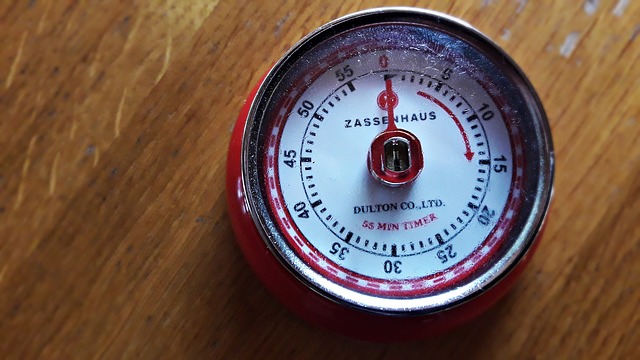
“There is nothing to writing. All you do is sit down at a typewriter and bleed.” ~ Ernest Hemingway
~
Recently, I heard about a writing technique called “The Kitchen Timer Technique.”
For those of you fully ensconced in the world of writing, it might be old news. But for me—a busy mom and editor whose writing time is precious and scarce—it was revelatory.
I first heard about this technique from Lauren Graham in her book, Talking as Fast as I Can. In it, she describes her own process for writing her book and trying to find the time to write. A friend and colleague, screenwriter Don Roos, shared this technique with her as a way to help her accomplish more in the limited time she had.
Of course, my curiosity was piqued.
Another one of my favorite writers, Glennon Doyle, shared her secret on her blog and in her books—waking up an hour before her kids and writing in her “cloffice,” her master bedroom closet that doubled as her office. The image in my head I had of her sitting on the floor of her cloffice with her laptop always made me smile.
But while it sounded good in theory, I personally could not imagine waking up even earlier than I already do—at 5:00 a.m.—to wake up my kids and get us all out of the house by 6:40 a.m. It just isn’t going to happen.
So when Lauren Graham shared this Kitchen Timer Technique, I was all ears.
It’s a very simple, actually. Here are the steps:
- Set your kitchen timer. It doesn’t even have to be the kitchen timer, of course. Use your cell phone, or ask Siri or Alexa to set a timer for you—for however much time you have right now. An hour is optimal, but if you only have 20 or 30 minutes, that’s great, too!
- Open up two new documents. One will be for whatever project you want to work on for that hour. And the second document will be for a simple journal entry.
- Once you start the timer, you start writing. And here’s the trick—you don’t stop. At all. If you get stuck on the project you’re working on, you simply move to your journal document and continue to write over there. You can write about your day or how stuck you are on your project. You can write stream of consciousness. Or you can simply write the same word or phrase over and over—like “I hate writing.” It doesn’t matter—just don’t stop writing until that timer goes off.
Oh, the other rule about this technique? No distractions. No phones, email, music that you can sing along to, internet, desk-straightening, reading—nothing. You commit to doing nothing but write.
This. Is. Genius.
How had I never heard of this technique before?! Does it really work? Is this really a thing? I decided to do some research and look into it.
What I found almost immediately is that there is a similar productivity hack called the Pomodoro Technique. In it, you set the timer for only 25 minutes to work on a task before taking a break and moving on to another task for another 25 minutes. The organizational nerd in me started getting really excited by this idea! Not just for writing, but for closet-purging, housecleaning—oh, the possibilities!
But writing, as most writers know, requires discipline. And this simple technique just might help with that ongoing struggle—at least for me. Because the thing about the Kitchen Timer Technique is that, not only do you work toward writing a new article or another chapter on your book—you also build the habit of sitting down and practicing your craft every day.
Morning Pages work for some people. I’ve always wanted to be one of those people. But then I remember that aversion I have to waking up before 5:00 a.m. Because children.
But this! This is something I can do in whatever amount of time I have to spare in a day. If it’s an hour, I can definitely get the rough draft of an article written. If it’s 30 minutes, maybe I just write a blog post. If it’s only 15 minutes, maybe I see how many haikus I can write—about not hating writing.
The point is that we are keeping our appointment with writing. That’s it.
And even if we spend the whole hour writing in our journal because nothing else is working, that’s okay! It’s still writing…and hey, if you’re anything like me, our mental health might benefit from some more journal writing anyway.
`
“Start writing, no matter what. The water does not flow until the faucet is turned on.” ~ Louis L’Amour
~
~
~
Author: Christy Williams
Image: Pixabay/kasiaczernik
Editor: Travis May
Copy Editor: Catherine Monkman
Social Editor: Waylon Lewis







Read 4 comments and reply